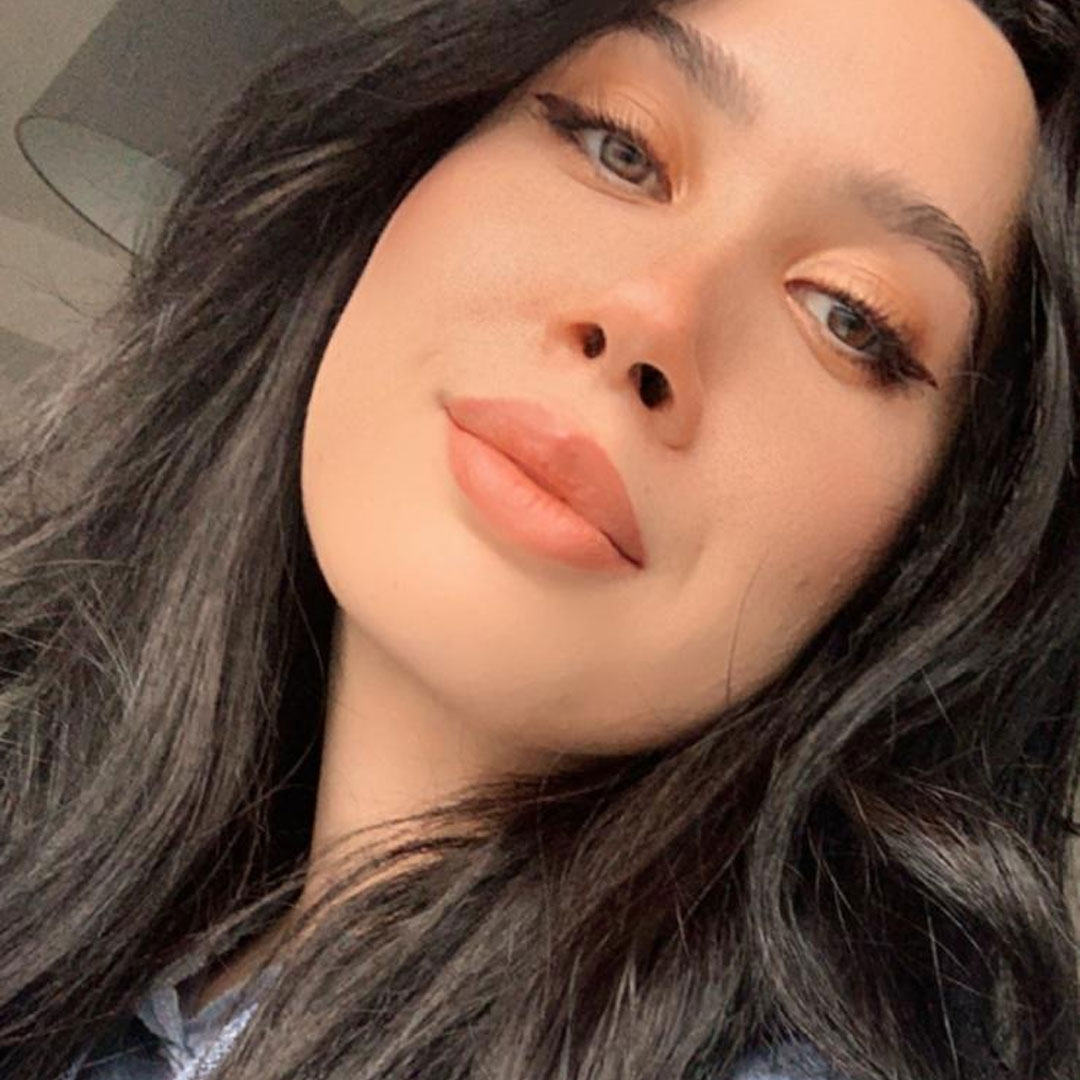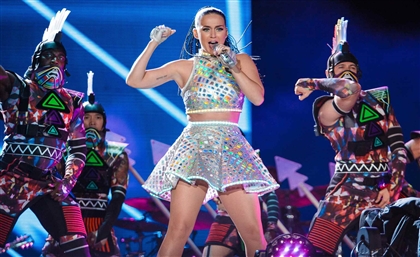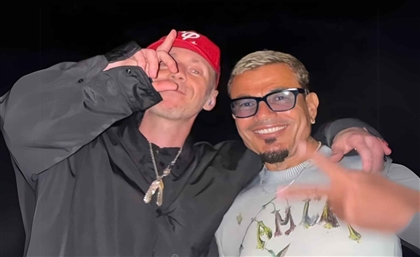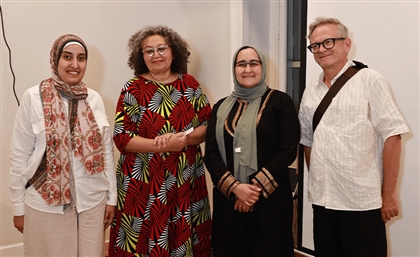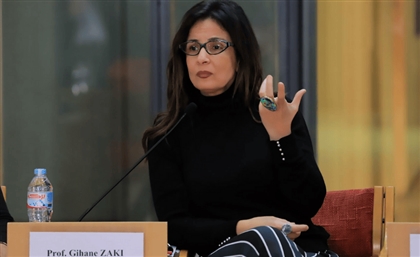Lana Lubany: The Face Behind TikTok Hit 'THE SNAKE'
Amidst the hustle and bustle of Picadilly Street’s finest coffee chains, Lana Lubany - the face behind the TikTok hit ‘THE SNAKE’ talks all things algorithms, mental health, and writing.
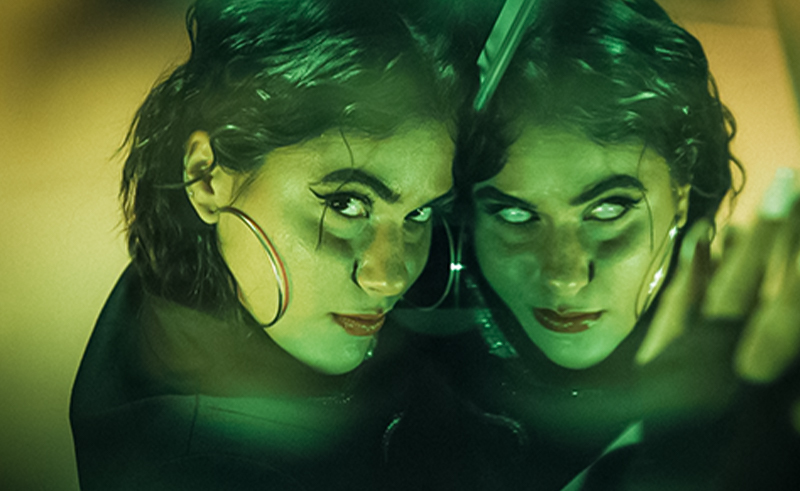
In the smoking chaos of Piccadilly Street in London stand the golden arches of Cafe Concerto. I mosey my way in and sit impatiently, waiting for my Iced Soy Vanilla latte to quench my thirst, and the ever so ravishing Lana Lubany to quench my loneliness.
This is a meeting I’ve been awaiting with high anticipation. I first contacted Lana in the thick of our pre-Eid workdays to arrange what would be my first-ever feature interview for SceneNoise. Four Instagram DMs later, we penned in an in-person meeting after discovering we’d be in London at the same time. And now, there I was, on a perfect Saturday morning, hoping for a perfect conversation. And that’s exactly what I got.
Enter Lana Lubany. She is as radiant in person as she is through her gorgeous social media posts. We sat face to face on the quilted couches of the glamorous cafe. Stumbling on the very few words I managed to muster, I blurt out, “Your TikTok, were you expecting it to go viral?”
With no long silences, this was the question that dragged us into the depths of a four-hour conversation where we discussed the ins and outs of the music industry, overnight fame, and artistry. “Kind of?” Was her answer to my initial question. “I had gone viral on TikTok back in 2020 when TikTok was starting to become the next big thing. I used to go viral for impressions, and then it became like song generator, lyric writing, and after that I went viral for writing songs inspired by random objects around me. A lot of that taught me a lot because it was all kind of taken away from me because the algorithm changed, and in 2021 I stopped going viral completely.”
With nothing but complete devotion to her music, 24-year-old Palestinian-American pop star Lana Lubany emphasized how this complete shift in her social media presence inaugurated what would be one of the hardest years of her life, “I had this like the major crisis of, like, why am I not getting somewhere? I didn't understand what was happening. And it was kind of really depressing actually. But by the end of 2021, I did a lot of self-discovery and a lot of work on myself. I spent a lot of time alone, just working on my mental health and writing things down, working on my awareness, which I think is so important. And eventually, by the end of that, I had a healthier relationship with social media. In general and with myself.”
Touching on her own self-healing journey quickly prompted me to ask her to wholly pick apart what that entailed. “So I was like, okay, let me write down my goals. Let me write down what I need to do in order to get to these goals. And I just did that. Without thinking about numbers without thinking about my worth relating to these numbers. I just did that. And I made the content that I needed to make in order to reach my goals, I was very clear about everything. And I organized myself and I spent time on it and gave planning importance. And then it just kind of came together because it made my mental health so much better. And having all these things laid out in front of me, showed me the path I needed to follow to get there.”
Not pointing out how crazy organized and meticulous Lubany is, would be a hate crime at this point. It’s clear from hearing her talk that the artist’s attention to detail and planning is akin to that of a mad scientist. Every step calculated, every decision mulled over with one eye on the future
.
“I knew what I had to do,” she continued. “I was like, okay, I'm gonna release ‘THE SNAKE’ because I’ve had the song since the summer. So Ben [my producer and co-writer] and I wrote ‘THE SNAKE’ in the summer before LA. Whenever I showed the song to people, they just reacted differently. So I was like, ‘Okay, this is the next song that I’m going to release’. And that’s all I know. When I posted the video with my mom, ‘THE SNAKE’ had been out for three weeks already. It wasn't viral or anything. I wasn't expecting it to go viral because I was like, okay, I'm just gonna keep on making content until I have to release the next song. And then I'll keep on making content for that. Eventually, something will catch on.”
And catch on it did. Perhaps unexpectedly, but Lubany was prepared, and perhaps had even subconsciously manifested this moment. The Arabic/English hybrid song trickled down into existence through years of exposure to her mother’s array of classic tapes. Whilst there was no direct influence on the song - some might even say Lubany and her co-writer Ben wrote ‘THE SNAKE’ in a studio vacuum of their own - the hit had been years in the making.
Though this was my first music editorial feature, I knew I had the duty to dig into Lubay’s discography – how else would one contextualise her current work and rising fame? Many backseat-car listening sessions later, it was her EP, titled ‘Devil in My Eden’ that stood out to me. It struck me as a little genre-bending - perhaps experimental - of a release for the rising pop star. So different that I had to inquire as to where that piece of work falls in her mental catalogue.
“To me, everything before ‘THE SNAKE’ doesn't really represent me anymore…If I could wipe everything and just keep ‘THE SNAKE’ I would. I guess that's one of the reasons why [the title] is in capital letters and everything else isn’t? Because it's a new era. And I'm excited about [it].”
Sitting with any independent artist always feels like free game and insight into the intricate crevices that is the music industry. What I was fully not expecting to learn, however, was how integral healing as an artist is to ‘making it’ as an artist. Hearing about Lubany’s undertaking of her own healing journey post-algorithmic shift and the cognitive dissonance that followed, is truly commendable.
With much of the inner workings of the music industry completely contingent upon the artist’s personal timeline, Lubany knew she had to put herself first if she wanted to continue making art, “I think in order to heal, you need to reflect, you need to reflect and accept your flaws, and the things that you do wrong. So, to me, that was a flaw in my mindset. And I had to work on it. And the minute I realise that there's something wrong, I feel liberated. It kind of slowed things down for me, because I, you know, I want to be doing big things right now. But I realized that I needed to be patient and I couldn't rush things. Because, by me trying to rush things for the past five years, I've actually slowed them down by a lot. But it is what it is. And I'm here now. So I think the most important thing or one of the most important things is acceptance, awareness.”
Talking about social media triggered a thought I’d been reflecting on for some time, regarding the intricacies of music distribution and how its methods have changed over the years. Being 20 going on 21, I’m what people are now labeling as ‘Gen-Z’. I grew up with iTunes. Digital music distribution. I saw firsthand CDs becoming obsolete, with platforms like Spotify and Apple Music taking over. I knew that back in the day, people used to hand out their demos at gas stations, train stations, in front of label headquarters. You don’t need to be involved in the industry to know that the shift from that to social media is hugely pivotal for the medium of music as a whole, both in creativity and business. I asked Lana how she felt about this change, and whether social media being the main conduit for music could get overwhelming at times.
“I think because a lot of people don't get this social media shift, they hate it. I think that's the wrong mindset…we need to be open to change…There's gonna be new things like NFTs which I personally don’t get right now…But I know I should be getting more familiar with it. So in order to keep being successful, you have to keep on evolving. I think that's so important. So with social media, I've always been an internet girl. I love content and I love creating in general – not just music, but also videos, and all types of digital content. So that's why I don't mind the social media game… [it’s] a path that really suits me.”
Having dived deep into the meta of what will soon be the metaverse (social media), I brought the focus back down to ‘THE SNAKE’. “Were the religious connotations in ‘THE SNAKE’ and the kind of underlying biblical imagery that followed intentional?” I asked.
“So yes, but not in a religious way. [I used] the snake from the Bible as a metaphor, because I just think there are so many things in religion that can be made into [beautiful] metaphors. And artistically, it just felt right.”
Somewhere between dissecting media-induced mental health crises and intellectualizing one-hit wonders, the topic of Lubany’s upcoming gig came up, and she had a lot to say about performing live. “In my opinion, the more the better. If I'm performing to 10 million people, I think I find that less scary than performing in front of 10 people. [The upcoming show is] max 100 people, but it's going to be fun like I'm going to enjoy it. I know my friends are going to be proud as well. So they hyped me up which is super sweet.”
At the time of this piece’s publication, Lana Lubany’s London show came and passed with great success. That being said, it’s clear she’s still buzzing from the feeling of having real-life people confirm the digital fact that ‘THE SNAKE’ was a hit.
The song openly challenges the near-sightedness of Arab pop critics. Fortifying her mother tongue, the song deviates from the mainstream music scene, overtly paying homage to home and attempting reconciliation with a tender past. Sung beautifully and produced impeccably, the song is every diaspora baby’s dream. Imbued with an eerie sense of nostalgia, the emotion-charged ballad refers to home alongside the spectacle of being a young artist, as it captures that very precise, elusive feeling of being trapped in the thick of art.
- Previous Article HOW (NOT) TO GO TO A PING PONG SHOW
- Next Article Zaid Khaled Releases ‘Tab Baaden?’ Produced by Zaid Kreshan







